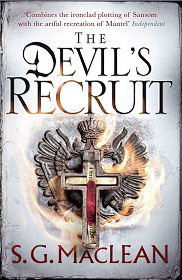 |
"The Devil's Recruit" by S.G. MacLean is a truly outstanding historical crime novel we would without hesitation recommend to anyone interested in a superbly crafted story. The pitfalls awaiting any author are many and varied, but those that must be avoided by an author of historical fiction can completely stop a story in its tracks. Geographical and historical setting, characterisation and even use of language must all ring absolutely true, and in "The Devil's Recruit" Shona MacLean succeeds in totally immersing the reader in a world that, while in some ways familiar, is strikingly different from our own.
The book is mainly set in Aberdeen in October 1635. Alexander Seaton, who we have met in three previous books by the author, is looking forward to achieving his lifetime ambition, of leaving the academic world to become the minister of his local presbyterian church. But these are troubled times. A ship lies in the harbour, a base for an officer touring Aberdeen's taverns to sign up Scottish recruits to fight in what we now know as the Thirty Years' War; and for the mysterious cloaked recruiting sergeant, who only comes ashore at night and who appears to have an unexplained interest in Alexander Seaton himself. Then two of Seaton's students disappear, including the son of a powerful Highland chief. And a girl is found murdered.
As page follows page the reader becomes ever more deeply involved in a story that offers genuine surprises en route to a remarkable climax in which ghosts from Alexander Seaton's own past turn out to be very real indeed.
We've previously reviewed Shona MacLean's Crucible of Secrets (just "Crucible" in paperback form), Alexander Seaton's previous outing, and "The Devil's Recruit" is a worthy successor. We did wonder, however, why the author had been rebranded from "Shona MacLean" to "S.G. MacLean". An online interview suggests this was not necessarily the author's own idea and was intended to give the books a less feminine identity. This has a striking resonance: the Wikipedia entry about George Eliot notes that "She used a male pen name, she said, to ensure her works would be taken seriously." It is sad that the same logic appears to be viewed as appropriate 150 years later. What next: "A.M.C. Christie" and "D. du Maurier"?
InformationHardcover: 368 pagesQuercus Publishing www.quercusbooks.co.uk 14 March 2013 Language: English ISBN-10: 1849163170 ISBN-13: 978-1849163170 Buy from Amazon (paid link) Visit Bookshop Main Page |
